
Title: Breaking the Waves
Year: 1996
Director: Lars von Trier
Writer: Lars von Trier
Cast: Emily Watson (Bess McNeill), Stellan Skarsgård (Jan Nyman), Katrin Cartlidge (Dodo McNeill), Jean-Marc Barr (Terry), Adrian Rawlins (Dr. Richardson),
Runtime: 158 min.
Synopsis: In a small and conservative Scottish village, a woman's paralytic husband convinces her to have extramarital intercourse so she can tell him about it and give him a reason for living.
Rating: 7.488/10